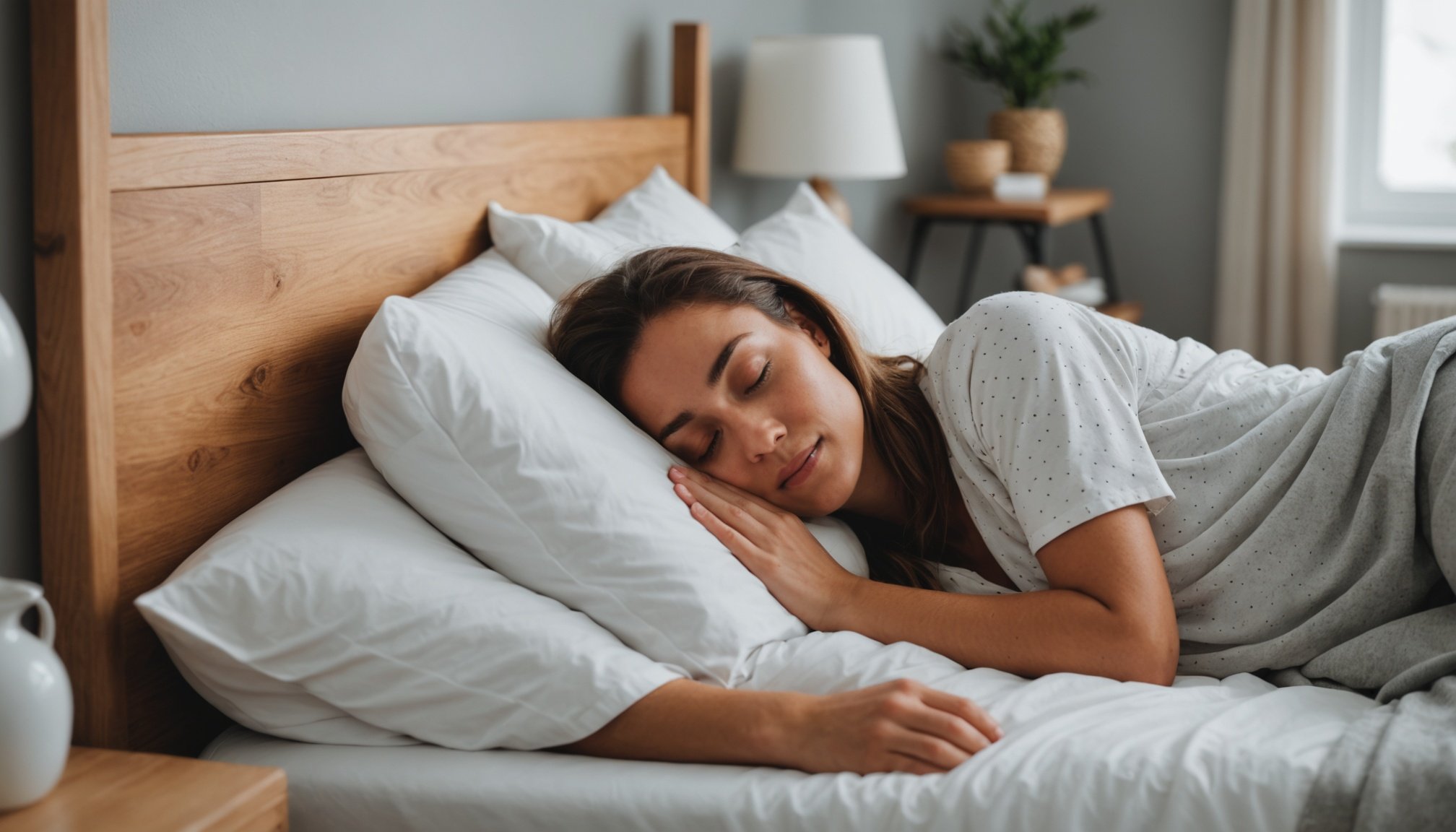Understanding Sleep Hygiene
Fostering good sleep hygiene is crucial for achieving restful nights and increased daytime alertness. The foundation of sleep hygiene is creating a proper sleep environment. A clean and comfortable setting, free from distractions, can significantly enhance sleep quality. It’s important to pay attention to the room’s elements, including temperature and lighting.
Experts suggest maintaining a cool room temperature, ideally between 18°C and 20°C, to facilitate sleep. Additionally, minimising light exposure before bed is beneficial; use blackout curtains or an eye mask if natural light intrudes.
In the same genre : Top Strategies for UK Adults to Cut Down on Sugar Consumption
Incorporate specific sleep hygiene practices for improvement. Regular sleep schedules, avoiding caffeine or heavy meals before bed, and incorporating relaxation techniques like reading or meditation can be effective. Numerous UK sleep tips, widely endorsed, emphasise the value of a consistent pre-sleep routine. This might include winding down activities an hour before bed, reflecting on the UK-specific approach to combating common sleep disturbances.
Prioritising sleep hygiene not only optimises time spent asleep but also significantly enhances overall wellness. Reassess your sleep habits and environment to ensure they align with these expert recommendations for a rejuvenating night’s rest.
In the same genre : Top Tips for UK Parents to Foster Healthy Sleep Routines in Kids
Establishing a Consistent Bedtime Routine
A consistent bedtime routine is crucial in maintaining a healthy lifestyle. Sticking to a regular sleep schedule helps regulate the body’s internal clock, directly impacting overall well-being. Establish a pattern by going to bed and waking up at the same time daily.
Incorporating relaxing pre-sleep rituals enhances sleep quality, especially in the context of the UK lifestyle. Consider activities such as reading a book, meditating, or taking a warm bath before bed. These habits can help signal the brain that it’s time to wind down, promoting a more restful sleep.
Cultural elements in the UK, such as late-night social gatherings or high caffeine consumption, can disrupt sleep routines. Adjusting your environment to minimise exposure to such factors can significantly benefit your sleep pattern. For instance, reducing screen time before bed is advisable, as the blue light emitted can interfere with the body’s natural melatonin production.
A tailored bedtime routine that accounts for local customs not only improves sleep quality but also enhances daily energy and mood. Adapting your sleep schedule to fit your lifestyle paves the way for a healthier, more invigorated life.
Managing Stress and Anxiety for Better Sleep
Navigating the complexities of stress management is crucial for securing a good night’s rest. In the UK, many individuals struggle with sleep anxiety, which can significantly interfere with their ability to unwind before bedtime. Techniques such as mindfulness and relaxation exercises are not only popular but also effective means to mitigate pre-sleep tension.
Mindfulness, a method gaining traction across the UK, involves focusing on the present moment, often through guided meditation or deep-breathing techniques. These practices help ground the mind, fostering a state of relaxation and reducing sleep anxiety. Incorporating these exercises into your nightly routine can ease the transition from a busy day to a peaceful bedtime.
For further support, turning to local UK mental health resources can be invaluable. Organisations such as Mind and the Mental Health Foundation offer guidance and tools aimed at combatting stress-related sleep issues. Leveraging these resources can enhance your approach to stress management, providing you with both emotional support and practical strategies. Engaging with these techniques and resources not only promotes restful sleep but also contributes to a healthier, more serene lifestyle.
Reducing Screen Time Before Bed
Reducing screen time effects on sleep quality is essential for improving your rest and overall well-being. Studies show that exposure to screens before bed can lead to difficulties falling asleep and reduced sleep duration. Blue light from devices can interfere with melatonin production, a crucial hormone for regulating sleep cycles.
To combat these effects, consider a digital detox by implementing a screen-free period at least an hour before bedtime. This break allows your brain to unwind from digital stimuli, facilitating a smoother transition into restful sleep. Engaging in relaxing activities such as reading a book, meditating, or gentle stretching can be effective alternatives.
In the UK, cultural attitudes towards technology significantly influence technology habits and sleep patterns. Many people are accustomed to using their devices until the moment they shut their eyes. However, recognising and transforming these habits can lead to better sleep hygiene and health outcomes. Prioritising unwinding and de-stressing without digital interference encourages improved sleep and supports a balanced lifestyle.
Recognizing Potential Sleep Disorders
Identifying sleep disorders is crucial for maintaining overall health and well-being. Common conditions, such as insomnia, significantly impact individuals’ daily lives. In the UK, healthcare services report that insomnia affects millions, leading to fatigue, irritability, and difficulty concentrating. Early signs of potential sleep disorders often include prolonged sleep onset times, frequent nocturnal awakenings, and non-refreshing sleep despite adequate duration.
For those experiencing persistent sleep issues, consulting healthcare professionals is vital. They can accurately diagnose and differentiate between various sleep disorders. The UK healthcare system offers numerous resources, including primary care consultations and referrals to specialised sleep clinics.
Available treatments in the UK range from cognitive behavioural therapies to medications targeted at specific symptoms of sleep disorders. Support services also play a pivotal role, offering guidance and strategies to improve sleep hygiene. Recognising and addressing sleep disorders can lead to profound improvements in quality of life.
Local Resources and Support for Sleep Improvement
Understanding the multitude of sleep resources available can be vital for improving sleep health. In the UK, several organisations cater specifically to sleep improvement. Local organisations and helplines like the Sleep Council offer guidance and support to individuals struggling with sleep issues. Their expertise helps address various sleep disorders and provide tailored advice.
In addition, many online platforms have become popular among UK residents for tracking and enhancing sleep patterns. Sleep apps such as Sleepio and Calm not only offer insights into sleep habits but also propose personalised solutions through cognitive behavioural techniques and relaxation tools. These platforms are widely accessible, providing resources that blend technology with health science to promote better sleep.
Moreover, community support initiatives can be found across urban areas, encouraging healthier sleep habits. These initiatives may include workshops, meetups, or awareness campaigns focused on elevating public understanding of the importance of sleep health. Engaging in these community efforts helps create a support network, thereby fostering a culture of well-being. Together, these resources contribute towards comprehensive sleep improvement strategies, addressing both individual and community needs.











